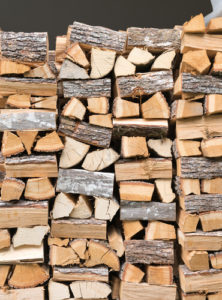If you own a wood-burning fireplace, then you’re likely an expert at building fires. But did you know that the wood you use plays an important role in the fire-building process? Wood that contains too much moisture will burn much less efficiently, and it isn’t good for your chimney, either. Learn more about the negative impacts of using unseasoned firewood below. Then, keep reading to find out how to season your own wood, so you can build the perfect fire every time!
Results Of Using Unseasoned Wood
Using unseasoned wood can quickly make any fireplace experience turn bad. Wood with more water to burn through is known for smoking more and triggering an unpleasant odor. Your nice evening in will be ruined as smoke fills your living room, and family members and guests will move elsewhere in a hurry!
Along with this, your chimney will suffer. As the fire uses energy to burn through the excess moisture, all of that smoke will deposit acidic water in your chimney’s liner. This leads to more creosote and debris accumulation, which triggers more deterioration throughout your system as a whole.
On top of this, you’re risk for chimney fires will increase dramatically since more creosote will be present. Chimney fires greatly diminish the integrity of your chimney’s structure, and they leave your home more vulnerable to fire, too. You’ll face lots of bills as you invest in expensive repairs, and you won’t be able to light any fires until things get patched up. Save yourself the stress by picking the right firewood from the start!
Lastly, firewood that hasn’t been properly seasoned simply doesn’t work as efficiently as wood that has. Even if you get through it without major smoking problems, you’ll find yourself with less heat output, since so much energy was wasted burning through the extra water. Using unseasoned wood really isn’t worth it… Invest in the good stuff from the start – you won’t regret it!
Signs Of Seasoned Wood
The best way to ensure your firewood is seasoned correctly is by doing it yourself! Store your wood pile off of the ground, preferably in a shed with open sides. Otherwise, leaving your pile out in the open is fine, just be sure to cover it when it’s rainy outside. For best results, store your firewood for at least 6 months and in an area where it gets lots of exposure to sunshine and windy weather.
If you are unable to store your own wood pile, then there are ways to ensure the wood you purchase is good to go. First of all, wood that has been cut shorter will likely be better than longer pieces. Next, check the ends and see if they are darker and split. If so, you’re right on target! Also, try to find pieces that are lighter in weight, as this means less water is present. Lastly, knock two logs together. If they make a hollow, clunking noise, you should be good to go!
We wish you success in all of your future fires… Good luck from the staff at Mason’s Chimney Service!
